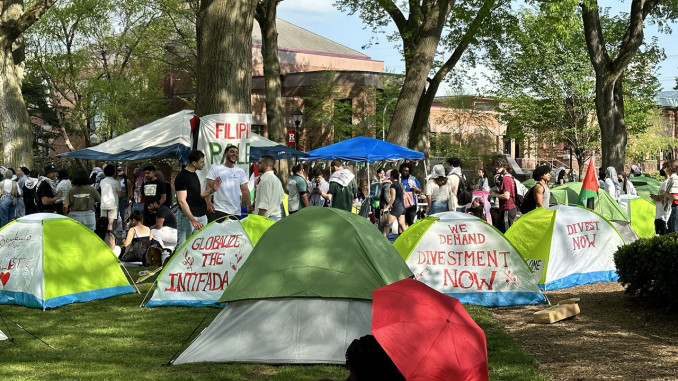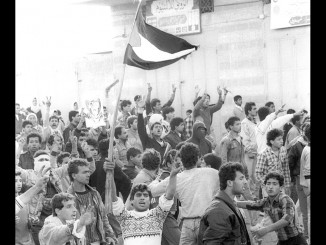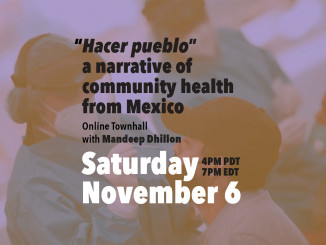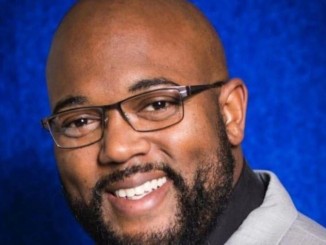
Since October 7, by even the most conservative estimates, the Israeli state has killed over 40,000 Palestinians in Gaza. The United States funds this genocide, sending billions of dollars annually to Israel in money and weapons. When students at Columbia University demonstrated their opposition to the genocide by forming an encampment, they were met with repression from the administration. This only sparked a larger student movement with students setting up over 170 encampments on college campuses across the country and around the world. On May 1st, the Newark Solidarity Coalition (a group of students, faculty and community members in Newark, NJ) joined the movement by starting a solidarity encampment on the Rutgers Newark campus. Among demands common to almost all the encampments, the call for local reinvestment is unique to the Newark encampment.
Our demands are summed up as: Disclose, Divest and Reinvest.
Disclose – Rutgers Newark must be transparent about their endowment investments in supporting Israel’s genocide and the military industrial complex.
Divest – That money must be taken out of those investments.
Reinvest – The money that is taken out of genocide and war should be put into the Newark community, towards providing for our needs like affordable and public housing.
Negotiations were conducted by the initial organizers of the encampment and the administration of Rutgers-Newark. Unlike negotiations at other universities, these negotiations were accessible to the public and live streamed at the encampment itself. This allowed for campers to be part of the decision- making even if they weren’t physically in the negotiation room.
There were not just students that camped out – there were faculty, some workers, and community members, including houseless people. The camp had more than sleeping tents. There were food tents, medic tents, a People’s Library and more. Some campers made an active attempt to reach out to people passing by and educate them about the connections between the genocide and the problems we face at home. Everyday there was an agenda set with teach-ins, yoga, mental health check-ins and art builds. Campers and people who passed through commented that the encampment made the area it was in feel safer than ever before, much safer than the shelters some people are forced to go to when displaced.
Despite this, the camp was shut down under direct threat of force. On June 9th, the day after some campers hosted an open mic rally, the administration, Rutgers Police, Newark Police and NJ Transit police delivered a letter directing the campers to leave the premises within 30 minutes or face prosecution.
We can’t be surprised by this. As long as there exists a system in which a few people hoard the wealth generated by the majority and stake themselves as the sole decision-makers, there will continue to be wars, genocide and violent oppression to maintain their system of constant oppression.
These campus encampments have done a lot to start a very necessary conversation about where we allow our resources to go. However, they have also shown the limitations of student movements which by themselves are limited, but can reach out and engage the true source of our power, the power of the working class. We need to organize among ourselves in the working class because we are the ones that make the world run. We, the working class, should be the ones to run the world!
Speak Out for Palestine
The day protesters were forced to decamp, a member of Speak Out Now, Newark Solidarity Coalition organizers, as well as others at the encampment hosted a speak out or open mic rally inspired by the feminist movement’s “Tell It Like It Is.” The goal of these is summed up by Peggy Dobbins, a sociologist and a civil and women’s rights activist, “If you spoke your personal experience, you discovered it was shared. If it was shared, it was social. And if it was social, it was political. And if it was political, you could do something about it.” At the rally, everyone spoke out, from an 11-year-old public school student to a veteran housing rights activist to a military veteran. People were inspired by others to share their own stories as they were moved by each other.
RUPD, Newark Police you can’t hide; you’re supporting genocide
At 7a.m. on Sunday, June 9th, a letter was delivered to the encampment warning the peaceful protesters, “I advise you, then, that you must leave the New Street Plaza within 30 minutes or be subject to prosecution under the laws of the state and the University’s disciplinary process. The time to leave is now. You have 30 minutes to comply with this order.” Newark Police, Rutgers Police as well as NJ Transit police surrounded the entire encampment, blocking off all 4 streets surrounding the section of the campus that the protesters were set up in. Leaders of the encampment negotiated with the administration to gain more time to move all of the valuables stored at the encampment. The administration would only allow piecemeal time additions as the protesters were being pushed out. An administrator said they were negotiating in good faith. This was a lie, as they brought violent force down upon peaceful campers who were trying to stop a genocide.
Housing is a Right. End Forced Displacement Everywhere
One of the demands made by those at the Rutgers-Newark solidarity encampment was for the school to reinvest in providing affordable, public housing for Newark residents. Many of the protesters that camped out to protest the genocide were themselves homeless or faced housing insecurity. For these campers, the encampment was safer and less restrictive than a shelter. They could stand up for what they believed in as well as get what they needed to survive. Now that the encampment has been shut down, some of these protesters are once again left without a safe place to stay. The shutting down of the protest paralleled the forced displacement that people face right here in Newark and around the world. Protesters took to City Hall to demand housing vouchers for those displaced by the closure of the encampment. There are more vacant houses, hotel rooms, and office spaces than homeless people. The problem isn’t that there’s not enough to go around. The problem is that large banks, companies, and land owners are gate-keeping people’s basic needs in order to make a profit.
Healthcare is a Human Right. We keep Us Healthy
Beyond the medic tent at the encampment many healthcare workers and professionals also passed through to show their support for the fight against genocide. A nurse from Gaza shared their experiences. In Gaza, hospitals were deliberately destroyed by the Israeli military leaving healthcare workers without the tools necessary to take care of those injured by the constant bombardments. Healthcare workers in and around Newark empathize with the stresses of taking care of people, while the underlying problems leading to disease and injuries continue to plague them. It’s like scooping water out of a ship with a gaping hole in the bottom. We don’t yet have a healthcare system, we have a wealthcare system.
It’s Not Over!
The encampment at Rutgers, along with others across the country, has ended with the end of the school semester as much as the attacks of the administrations and police. However, this is by no means the end of the movement. Israel’s genocidal war continues, and many people have had an experience of organizing and confronting the established power of the university system and the U.S. government. This fall, with students returning to school, an election in full swing, and every political question being raised by the situation, the movement will continue and the lessons learned this round will be carried forward.




